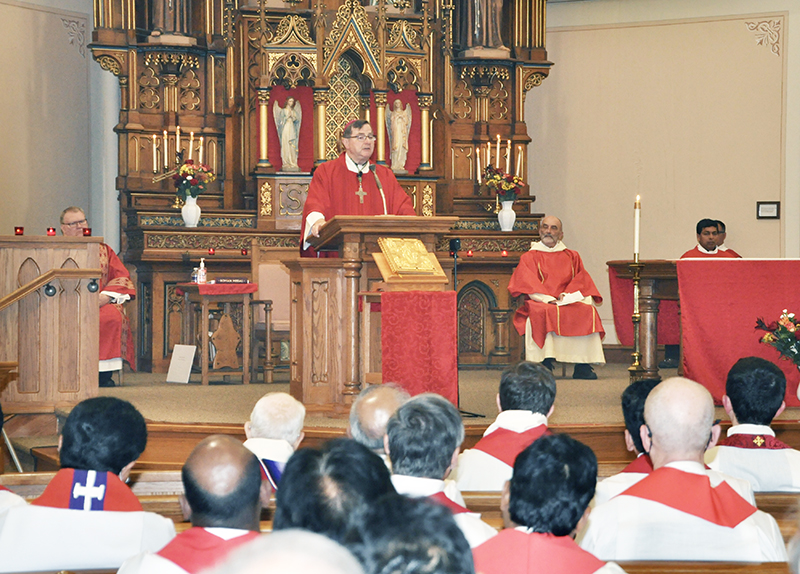
Bishop James Powers preaches to a congregation of mostly diocesan clergy at Our Lady of the Lake Church in Ashland on Monday, Oct. 18. The Mass celebrated the opening of diocesan preparation for the 2023 Synod of Bishops. (Catholic Herald photo by Jenny Snarski)
Jenny Snarski
Catholic Herald Staff
On Monday, Oct. 18 – feast of St. Luke the Evangelist – Bishop James P. Powers celebrated Mass at Our Lady of the Lake Church in Ashland to mark the opening of the Diocese of Superior’s preparation for the 2023 Synod of Bishops on synodality called for by Pope Francis.
Ashland was the site of the Mass, where clergy were gathered for their annual workshop. The large group of concelebrating priests, vested in white with red stoles, were themselves a visual representation of the universality of the church.
While the synodal process isn’t new – the regular summoning of bishops by the pope to develop the richness of unified Catholic teaching with an ear to the global circumstances and society in which Catholics live – the bishop stated he believes this is the first time every diocese in the world is being asked to participate at a local level.
“Pope Francis has called this synod to discuss the very notion of synodality,” Bishop Powers said and acknowledged the word itself is “elusive in its meaning.”
Summarizing, he called it “Ground-level discussing the needs, the life and the situation of the church,” within a set framework of three main themes: communion, participation and mission.
This synodal process’s purpose, flowing from Vatican II, Bishop Powers quoted, is “not to produce more documents, but to plant dreams, draw forth prophecies and visions, allow hope to be nourished, inspire trust, bind up wounds, weave together relationships, awaken a dawn of hope, learn from one another and create a bright resourcefulness that will enlighten minds, warm hearts and give strength to our hands.”
The bishop spoke of how Pope Francis see this synod as the fulfillment of the Second Vatican Council – building on central theme of universal call to holiness.
“By virtue of our baptism each and every one of us is called to the church’s mission of evangelization,” he confirmed. “The Holy Father is asking us to grow in true communion with the Lord and with each other, to bring out all the faithfuls’ gifts and charisms.”
Affirming the church exists to evangelize, Bishop Powers expounded, “We can never be centered on ourselves. Our mission is to witness to the love of God in the midst of the whole human family … This synodal process has a missionary dimension intended to enable the church to better witness to the Gospel; especially to those who live on the spiritual, social, economic, political, geographical and existential peripheries of our world.”
Bishop Powers clarified the process is not intended for just a few – not just those in church on Sundays.
“All God’s people coming together, journeying together as one,” he added then acknowledged St. Luke the Evangelist’s role of reaching those same groups of people in his day.
“Our synodal process is aimed at helping us to discover every town and place in the Diocese of Superior,” the Bishop said. “Especially those that are not only forgotten by society but sadly also have been forgotten by the church.”
“Let us pray,” he continued, “That with God’s help we may be truly open to the voice of the Holy Spirit, helping us to discern how we can send out to evangelize, to invite and to welcome home all of God’s children … Our situation in the world is different but not new. Throughout history people have wandered from the love of God.”
Echoing St. Paul’s enunciation of the gifts of the Holy Spirit in the liturgy’s second reading, Bishop Powers added, “Our God has created us and given each of us a task. A share in that building up of the King of God here and now … To the degree that each and every one of us fulfills that task is the degree to which the king of heaven exists here on earth, here in this time and place. But that the degree to which each of us fails to live that task is the degree that the kingdom is absent.”
Bishop Powers explained some of this synodal process’s logistics. He will be present at gatherings around the diocese to pray, discern and listen to representatives from all walks of life. There is also a portal for submitting public comments on the diocesan website. Reports submitted to the U.S. Conference of Catholic Church will summarized and submitted to the Vatican.
“These are exciting times,” the bishop noted, “for our diocese, for our church.”
